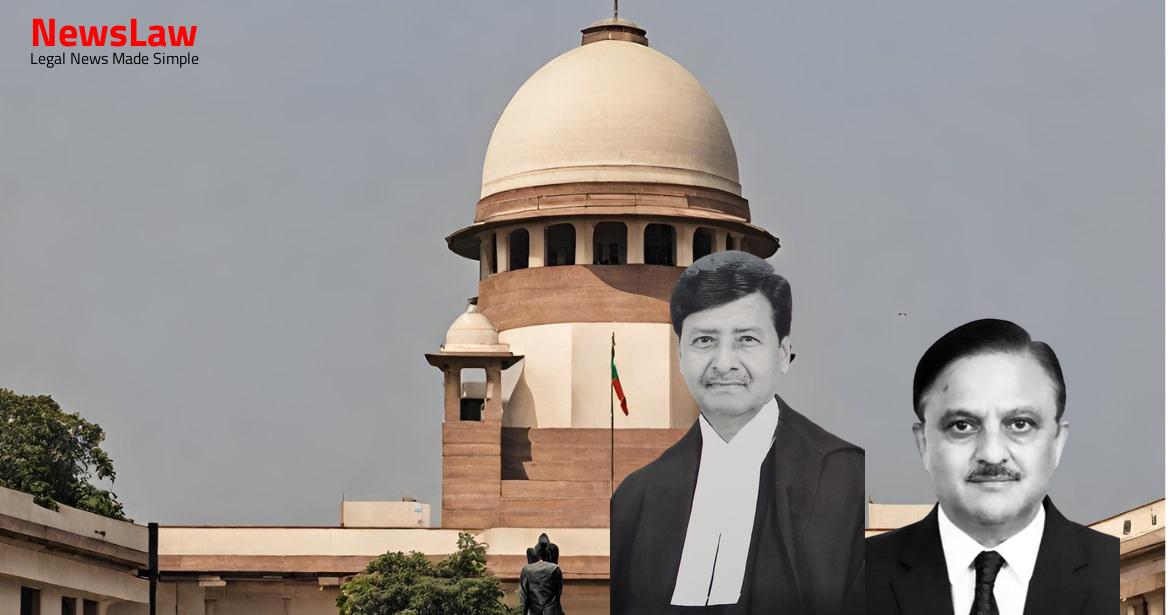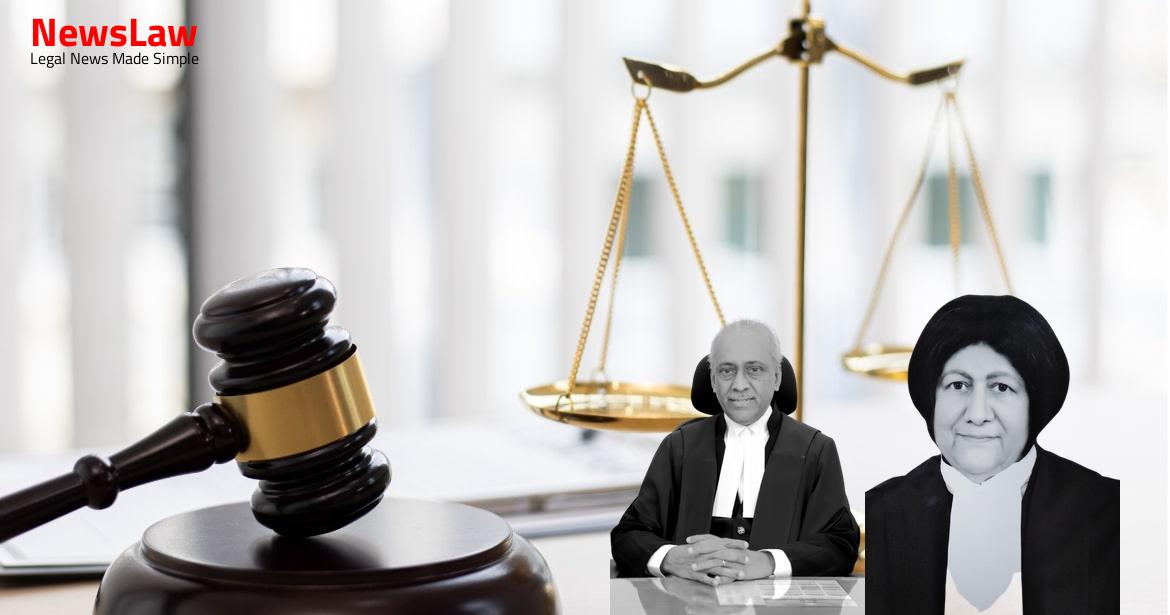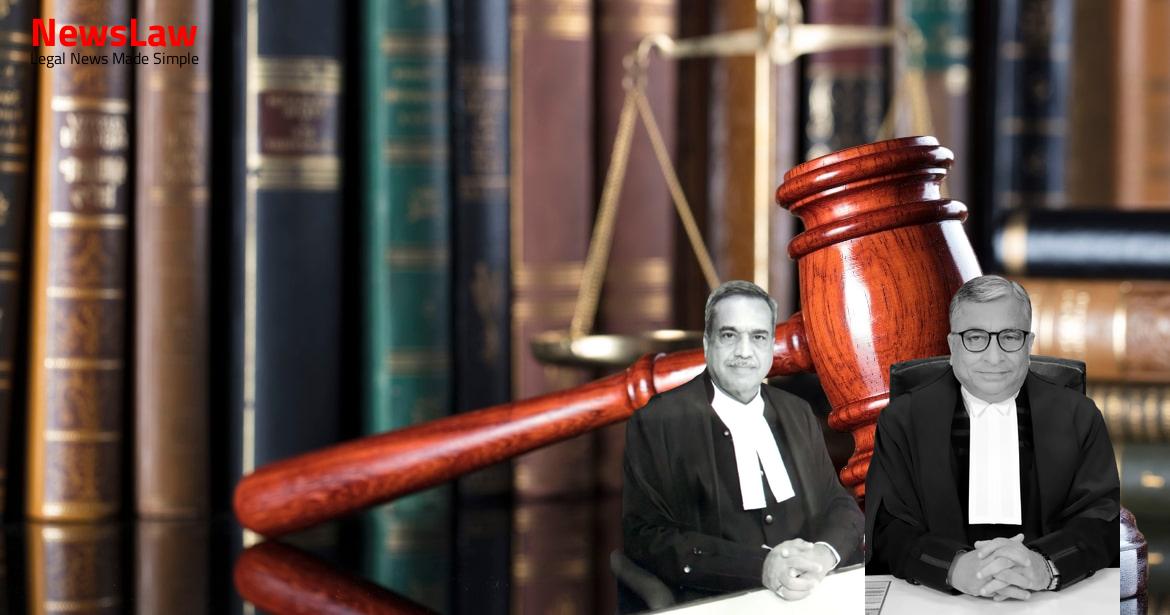Delve into the intricate legal analysis of a case where the court’s power in modifying arbitral awards was scrutinized. The discussion highlights the limitations imposed on the court, emphasizing the delicate balance between judicial intervention and statutory provisions. Stay informed on the nuances of court jurisdiction and arbitration law in this insightful overview.
Facts
- Amounts ranging from Rs.46.55 to 83.15 per square meter were awarded in SLP (Civil) No.13020 of 2020.
- Applications for substitution are allowed in these cases.
- The District Collector, as an appointee of the Government, made the arbitral award in all cases.
- No infirmity was found in the arbitral award, resulting in the same compensation amount being given to all claimants.
- A Division Bench of the Madras High Court disposed of appeals under Section 37 of the National Highways Act.
- The Court ruled that Section 34 of the Arbitration Act allows for modification of arbitral awards made under the National Highways Act to enhance compensation.
- The appeals were based on notifications issued under the National Highways Act and awards made by the competent authority, a Special District Revenue Officer.
- Initially low amounts were awarded, but through Section 34 petitions, the compensation was enhanced to Rs.645 per square meter.
- The District Court modified the Collector’s award accordingly, with the Division Bench upholding this modification and issuing a remand order for certain aspects of compensation.
Also Read: Interpretation of Section 43B: Debentures vs. Interest Payment
Issue
- The appeals in the present case pertain to the question of whether the power of a court under Section 34 of the Arbitration Act includes the power to modify an arbitrator’s award.
Also Read: Ensuring Transparency in Electoral Processes
Arguments
- The limited power of the court under Section 34 of the Arbitration Act in the context of the National Highways Act is different from the power of an appellate court under the Land Acquisition Act.
- The purpose of amending the National Highways Act in 1997 was to expedite the acquisition process for the construction of national highways.
- Compensation under the National Highways Act is determined by a competent authority and can be referred to arbitration if not acceptable.
- Unlike the Land Acquisition Act, the National Highways Act allows for arbitration where the arbitrator is appointed by the Central Government.
- The grounds of challenge and remedy under the Arbitration Act, 1996 are limited to setting aside or remitting the award.
- The argument presented by the Solicitor General emphasized the necessity of a speedy procedure for challenging arbitrator’s awards under the National Highways Act.
- The judgment in Gayatri Balaswamy has been a focal point for the respondents in these appeals.
- The Land Acquisition Act does not apply to acquisitions under Section 3J of the National Highways Act.
- In cases where NHAI has complied with the District Judge’s judgment by depositing compensation, no appeal was filed against such judgments.
- Setting aside an award under Section 34 can lead to a fresh arbitration process according to the law.
- Counsel referenced the judgment in Gayatri Balaswamy’s case and supported the reasoning presented.
- He agreed with the distinction made in the impugned judgment between consensual arbitration and arbitrators appointed by the Central Government.
- The argument presented was that the interpretation suggested by the learned Solicitor General could lead to a situation where there would be no remedy for a grievous wrong, as the District Judge could only set aside the award.
- This would result in a fresh arbitration before the same or another bureaucrat appointed by the Central Government.
- The appeals were proposed to be dismissed based on these arguments, even on merits.
- On merits, the facts of the case and the low compensation initially given were highlighted, pointing out the increase made by the District Judge based on relevant sale deeds.
Also Read: Analysis of Part IXB Constitution Amendment Act
Analysis
- The Judge is noted to have crossed the Lakshman Rekha and started legislating, indicating what the law should be rather than what it is.
- Differential compensation based on different public purposes is not permissible.
- The Judge emphasizes putting oneself in the shoes of the Parliament while interpreting statutory provisions.
- The National Highways Act’s amendments in 1997 are discussed, with implications on the awards and appeals process.
- The limitations and procedures under Section 34 of the Arbitration Act are highlighted and analyzed.
- The power to modify an award under Section 34 is extensively debated, emphasizing the courts’ limited role in interference.
- Discussion on the inability of the court to engage in an independent assessment of the award’s merits.
- Various court cases and law provisions regarding arbitral awards, land acquisition, and public purpose are referenced and analyzed.
- The need for caution in disturbing concurrent findings on arbitral awards upheld by the court is emphasized.
- Section 3G of the National Highways Act deals with the determination of the amount payable as compensation.
- The ‘competent authority’ is defined as a person or authority authorized by the Central Government to determine the amount of compensation.
- Before acquiring land for a public purpose, the Central Government must declare its intention through notification.
- If the amount determined by the competent authority for compensation is not acceptable to either party, an arbitrator appointed by the Central Government will review and determine the amount.
- The Central Government’s declaration for land acquisition cannot be questioned in any court or by any other authority.
- The process of land acquisition under this Act aims to expedite the implementation of highway projects by vesting the acquired land in the Government once declared for public purposes.
- Any disputes regarding compensation will be resolved through the arbitration process.
- The Land Acquisition Act of 1894 does not apply to acquisitions under the National Highways Act.
- The court can modify or correct an arbitration award under certain circumstances, as per the provisions stated.
- The court may remit the award back to the arbitrator for reconsideration under specific conditions.
- Once the time for challenging the award has passed, the court pronounces judgment based on the award, and a decree follows with limited appeal grounds.
- Parties make a conscious decision to exclude the court’s jurisdiction by opting for arbitration.
- The supervisory role of the court is kept at a minimum level as per the scheme of the provision.
- The power to modify or vary an award under Section 34 of the Arbitration Act is limited.
- The power under Section 34(1) includes the power to modify, vary, or revise an award.
- The court can correct errors of arbitrators while modifying or varying the award.
- An application for setting aside an award does not only mean seeking to set aside, but also modifying, enhancing, varying, or revising the award.
- The power to modify, revise, or vary the award does not exist under Section 34 of the Act.
- The court can only quash the award, leaving the parties free to begin arbitration again.
- Intervention of the court is limited to specific circumstances like fraud, bias, or violation of natural justice.
- Judicial interference is permissible in limited circumstances to ensure fairness.
- Provisions of Section 34 indicate the court’s power to set aside an award and adjourn a matter.
- Classification for legislation must have rational relation with the legislative object to be reasonable.
- Statutes define present rights and obligations and can be subject to purposive construction.
- The distinction between constitutional and statutory interpretation is crucial.
- The Constitution is a living document that must evolve to meet new realities.
- The judgment referred to by the learned Single Judge is Gautam Constructions and Fisheries Ltd. v. National Bank for Agriculture & Rural Development, (2000) 6 SCC 519.
- The judgment was under the Arbitration Act, 1940 according to the learned Single Judge.
- This case sets the context for the discussion on arbitration in the current case.
- NHAI has allowed others to receive higher compensation in similar cases
- Refusal to exercise jurisdiction under Article 136 for appellants due to this
- Refusal to send cases back for de novo start due to awards being 7-10 years old
- Claim of discrimination under Article 14 if different treatment given to equally situated owners
- NH Amendment Act, 1997 not challenged and therefore not commented on further
Decision
- The appeal is disposed of in above terms
- The appeals are dismissed on facts with no order as to costs
Case Title: THE PROJECT DIRECTOR NATIONAL HIGHWAYS NO. 45 E AND 220 NATIONAL HIGHWAYS AUTHORITY OF INDIA Vs. M. HAKEEM (2021 INSC 344)
Case Number: C.A. No.-002756-002756 / 2021



